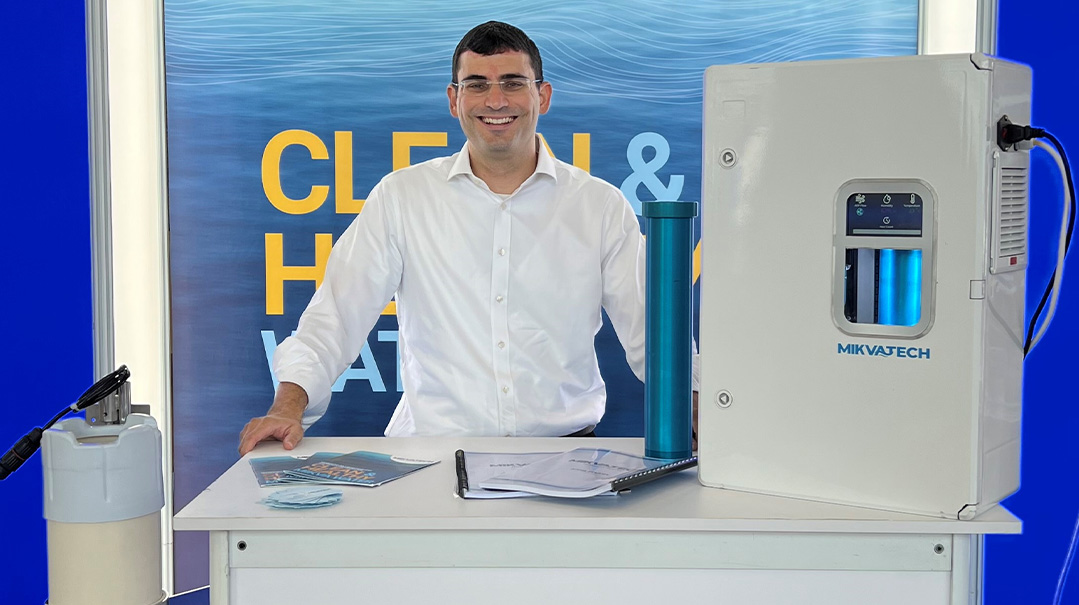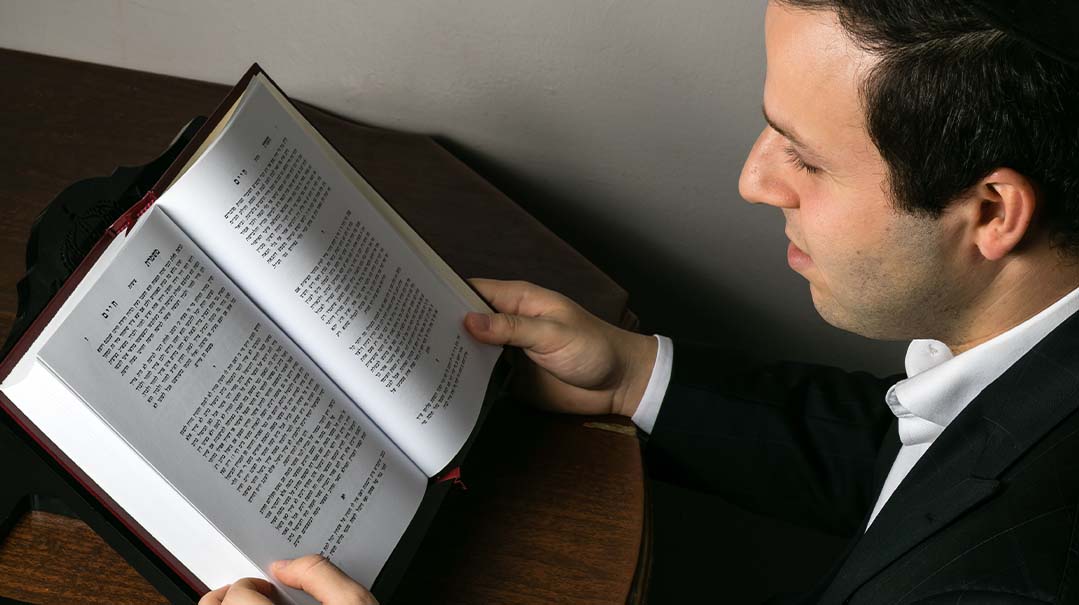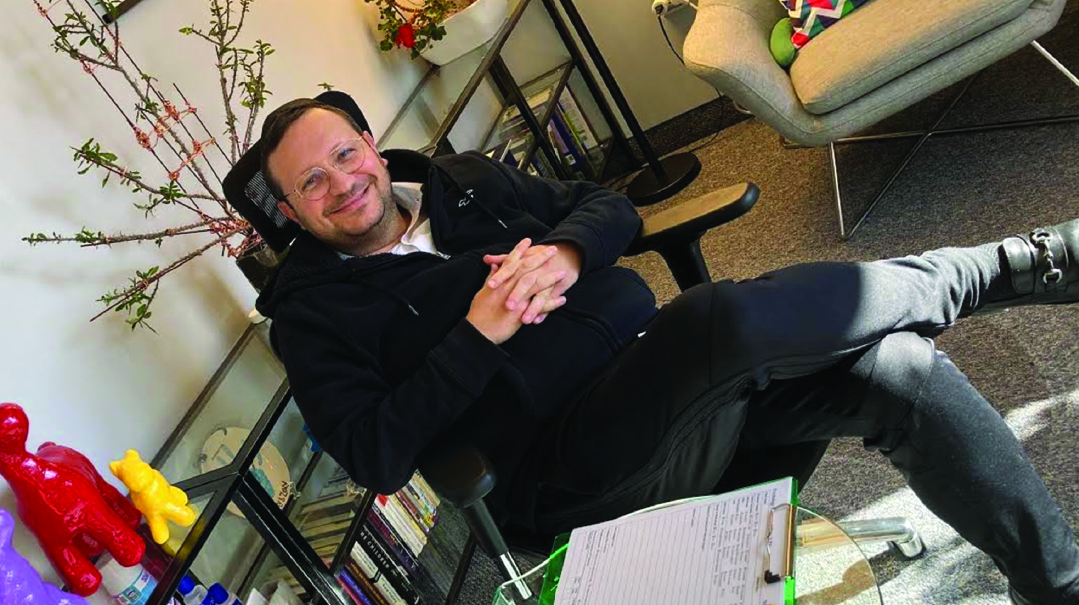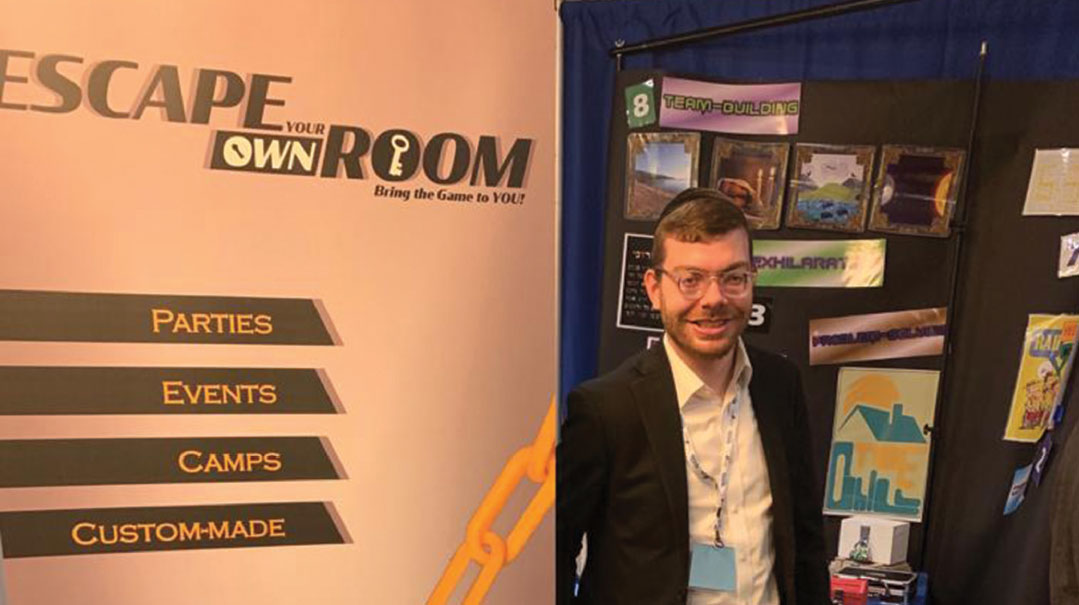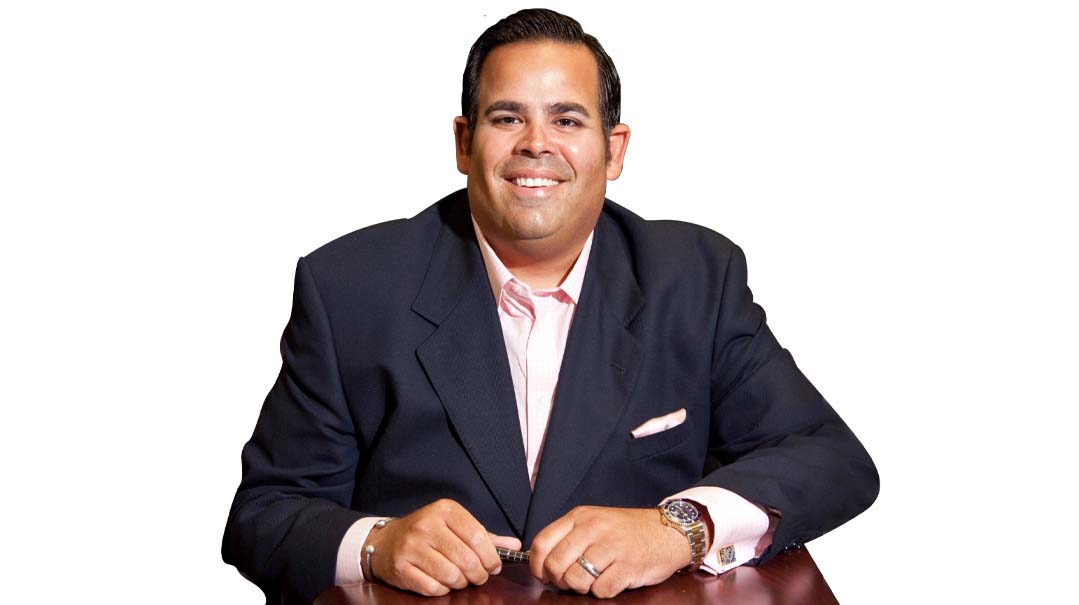A Day in the Life of…Rabbi Yaakov Moshe Resnick

"At first I called it the Shoel Umeishiv hotline, but a lot of boys don’t know what a shoel umeishiv is, so we changed it to Dial-a-Rebbi"
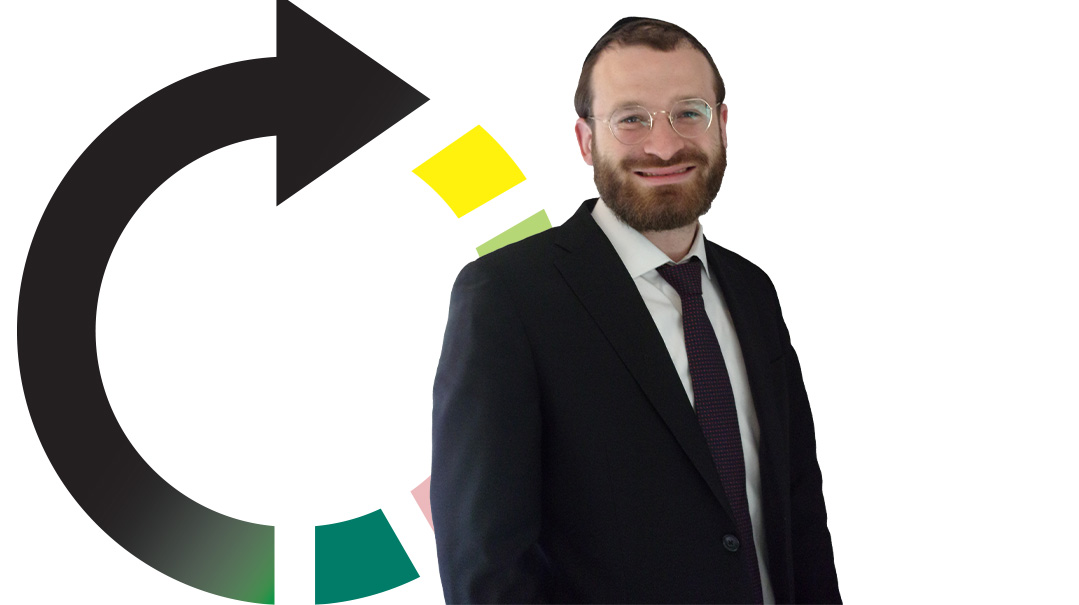
Rabbi Yaakov Moshe Resnick is the founder and director of the Shoel Umeishiv/Dial-a-Rebbi hotline. He lives in Cleveland, Ohio.
What I do: I run a Dial-a-Rebbi hotline for boys, 856-40-REBBI.
What that means
Kids come home from school with homework or chazarah, and if they have a question or need some help, ideally they turn to their father or older brother. But what about the boy whose father isn’t home — he’s working late, or the parents are divorced — or whose father doesn’t know the material? That’s where the Dial-a-Rebbi hotline comes in, it’s like a beis horaah line for students with schoolwork. We have rebbeim ready to answer any schoolwork-related questions: helping with a Rashi, teitshing a mishnah, reading a few lines of Gemara, answering a stirah between two gemaras. New York City has Dial-a-Teacher, a program that helps public school kids with homework. Dial-a-Rebbi is for questions in limudei kodesh — a free hotline for schoolwork questions.
When I came up with the idea
I learn with bochurim and younger boys once a week or so; I’ve been doing it for years. So many parents wanted to find a good chavrusa for their kid, so I made these lists of who’s available to be a chavrusa and I went into chavrusashaft shadchanus. When a kid needs a chavrusa, I look at my list to see who’s available, who’d be the perfect match, and I arrange it. I’ve made 100 shidduchim so far. Last Pesach, I noticed there were a lot of boys who didn’t need a chavrusa, but who could use someone to talk to in learning when a question came up. That’s how I got the idea.
How I got started
At first it was just local, for the boys here in Cleveland, and I asked some rebbeim to be meishivim. We did a test run — I set up a hotline that was open for half an hour a night, and I told local menahalim about it, because that was the easiest way to spread the word.
And how it grew
The feedback was phenomenal! Boys were calling in, meishivim were helping, and menahalim loved it. We decided to spread to Chicago and Detroit, and a few months later, in September, we started telling even more cities in the Midwest. I brought my friend Shmuel Dimarsky on board, he helps a lot with growing the hotline and fundraising to keep it going. After a few months, we went up to an hour and a half for the hotline, and I sent bookmarks with the phone number, and these special pens with lights and clips — I had ordered thousands of them with the phone number — to schools in the US and Canada. When the boys went home with the pens and pulled them out at homework time, they knew what to do!
Where we are now
At this point we’ve created a sophisticated phone system — callers are put in line if there are a few on at the same time, every call is recorded for safety purposes, and we’re now at three hours, five meishivim, and we’ve gone nationwide. We get calls from all the way up in Toronto to all the way down in Texas, from Lakewood and Los Angeles and everywhere in between.
Calling hours
The official hours are between 6:30 and 9:30 p.m., when there’s an on-call meishiv. The line is open 5 p.m. until 11 p.m., and in those hours it rings at all the meishivim, and if anyone is available, he picks up. Otherwise you can leave a voice mail and we’ll call back.
Our clientele
Frum boys. We have from third-graders who call to ask on the teitsh in Rashi who get shy when the meishiv gets on the phone, to bochurim in ninth grade who want the pshat on a Rishon. We had one caller, a 65-year-old man, who started off, “I’m not a boy but I have a question on the Gemara, can I call in?” Two yungeleit in Monsey learning Maseches Nazir called in with a bunch of questions “because the meishiv is a talmid chacham.” We also get calls from people with feedback, a mother once called to tell us that her husband comes home like 9:30 at night, until now her son never did his homework because he didn’t have someone to ask questions to. At the Torah Umesorah principals’ convention, a menahel came over to tell me it’s mamash techiyas hameisim, one of his boys calls in kim’at every night.
What they’re asking
Good gezunte boys are calling and asking geshmake questions, like the second- or third-grader who asked why Rashi considers the eastern side of the Mishkan the lifnei Hashem. Or the fifth-grader who asked if a succah can be made round. The meishiv directed him to a Gemara in Succah, where the teretz boils down to if the succah has to have corners or not. Or the eighth-grader who asked if someone throws an item off the roof, and a second person comes and breaks it, according to the Ramban the second person is patur because the item doesn’t have value anymore. The boy wanted to know if the same person who threw it off the roof then came down and broke it, is he patur because the item had no value anymore when he broke it?
How we’re answering
We can usually read the answer inside with the boys, but sometimes they call about an interesting side note, like the boy who asked, “Why is the masechta of Pesachim called Pesachim, which is plural, and Succah is lashon yachid, singular?” That actually got the meishiv thinking, he looked up the Tosfos Yom Tov for the answer, which is that there are two parts to the masechta, the first is about chometz and matzah and the dinim of bedikas chometz, and the second is about Korban Pesach. Once five or six kids called with the same question, so the meishiv said, “Come on, what’s going on?” and the boy told him, “Rebbi gave us a trivia question and offered a prize for the answer.”
And what we pass on
Sometimes we get a halachah question, the boy wants a psak, like the boy who called to ask if he’s allowed to break one of the three fasts before his bar mitzvah; the meishiv told him he’s supposed to ask his rav these kinds of questions. Once in a while a hashkafah question comes in, and that’s tricky, because that’s not the point of the hotline, but if a boy feels comfortable with the meishivim — the meishivim actually recognize the numbers of boys who call in often — and the meishiv feels comfortable discussing it with him, he will. The meishivim know if it’s outside their pay grade. In that case, they’ll figure out with the boy who he should discuss it with — his rav, rebbi, father, menahel, tutor, whoever.
Answering the call
We have five meishivim — two here in Cleveland, one in Los Angeles, one in Monsey, and one in Lakewood — and each one is a big talmid chacham; to do this, you need a lot of knowledge at your fingertips. One of the meishivim told me this is probably his most challenging job because he has to mamash be ready for anything!
Changes along the way
In the beginning, we didn’t want kids to wait on hold, so all calls would go out to all meishivim. It was a mistake, because all the meishivim were ready and waiting, which wasted a lot of their time, so we switched to an on-call meishiv and the others are backup. We also now offer a Yiddish option on the line, because we get plenty of Yiddish calls.
Best advice I got
That the vetting process of how we pick our rebbeim should be thorough — this is what the Vaad of Torah Umesorah told me and my friend Yossi Manne, who came to help me sell the concept to the menahalim at the principals’ convention this winter.
Our biggest challenge
Putting together the funds to pay the meishivim properly. At one point we were almost out of funds, and then a Yid stepped up to the plate — he believed in what we’re doing, and he’s still actively involved.
The toughest part of running this
When, three minutes before a meishiv is supposed to log on, he tells me something came up and he can’t do it. It’s easier with our new system, because if the on-call meishiv isn’t available, the system automatically calls the others, and usually someone else can take it. I remember once I was a backup and I took a call while I was driving. I told the boy, “I’m in the car now but let’s see if I can answer your question anyway.” Baruch Hashem I was able to help.
Prank calls
We get a few, but it’s not fun to prank us. Every call is handled seriously and matter-of-factly; there’s no joking around or having a silly time with a boy, even if it’s obvious it’s a prank call. We don’t get them often, but better a kid prank-call here than 1-800-MATTRESS or something else.
Most memorable call
Before we had calling hours end at 11 p.m., one kid called at 12:30 at night. The mother got on the phone, “My son just can’t go to sleep the question is bothering him so much,” and the meishiv helped him. Another time someone called in, his son wrote a fascinating shtickel Torah, a beautiful piece, and the father said, “I’m not so learned, I don’t really have the ability to read it, but I want someone to help me go through this so I can get the nachas.”
IN BRIEF:
Name change
At first I called it the Shoel Umeishiv hotline, but a lot of boys don’t know what a shoel umeishiv is, so we changed it to Dial-a-Rebbi.
By the numbers
- 5 nights a week the hotline is open: Sunday through Thursday
- 20–25 calls we average a night; on really busy nights it can get as high as 50
- 7,000+ schools Torah Umesorah told about our hotline after we got their haskamah recently
Day job
I’m in kollel full-time. I also teach halachah in Yeshivah of Cleveland.
Most common reaction
“Why has this not been done before?!”
Next up
We’re working on a girls’ hotline. Girls sometimes call, but the meishivim find they like to discuss things a little more; they don’t just want the answer, they want to schmooze out hashkafah with a rebbetzin or mechaneches.
(Originally featured in Mishpacha, Issue 913)
Oops! We could not locate your form.

